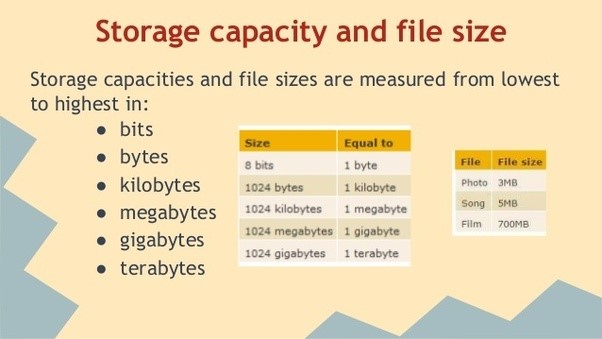How Many Gigs Are In A Terabyte
How Many Gigs Are In A Terabyte - As we continue to rely on technology for our daily activities, the terms gigabytes, terabytes, and petabytes are becoming more common. But do you know what they actually mean? In simple terms, a gigabyte (GB) is one billion bytes. A terabyte (TB) is 1,000 GB, and a petabyte (PB) is 1,000 TB. That's a lot of information to digest! But fear not, because in this post, we will break down these terms and give you tips on how to manage your storage.
Terabytes, Gigabytes, & Petabytes: How Big Are They?
Gigabytes (GB)
Think of a GB as a small storage unit. A typical smartphone has between 64GB and 512GB of storage, which is plenty for most people's needs. A single GB can hold about 250 songs or 1,000 photos. If you're someone who likes to store a lot of music or photos, you might want to consider getting a phone with more storage or investing in an external hard drive for your computer.
Terabytes (TB)
Now we're getting into larger storage units. A TB can hold about 250 million photos or 17,000 hours of music. It's what you'll typically find in high-end laptops or desktop computers. If you work in a field that requires a lot of data storage, like video editing or graphic design, you'll want to make sure your computer has at least a TB of storage.

Petabytes (PB)
This is the big one. A PB can hold 250 billion photos or 17 million hours of music. It's what you'll find in massive data centers that store information for companies like Google or Facebook. Fun fact: if you were to store the entire Internet (yes, the entire thing) in PB units, it would take about 12,000 PB. That's a lot of PB&J sandwiches!

How to Manage Your Storage
Now that you have a better understanding of how much storage you might need, let's talk about how to manage it. Here are some tips:
1. Delete Unnecessary Files
It's easy to let your files and documents accumulate over time without realizing how much space they're taking up. Take the time to go through your files and delete anything you no longer need. This includes old photos, documents, and programs you no longer use.
2. Invest in External Storage
If you're running out of space on your computer, consider investing in an external hard drive or cloud-based storage. This will give you extra space without having to buy a whole new computer. Just make sure to back up your important files in case anything happens to your external storage.
3. Compress Your Files
If you have a lot of large files, like videos or high-resolution photos, consider compressing them to save space. There are many free compression programs available online, like 7-Zip and WinRAR.
4. Be Mindful of Your Downloads
It's easy to get carried away with downloading files, especially if you're on a high-speed Internet connection. But each file takes up space on your computer, so be mindful of what you're downloading. Do you really need that extra app or game?
5. Use Cloud-Based Services
If you're working on a large project with multiple people, consider using a cloud-based service like Google Drive or Dropbox. This will allow you to collaborate and share files without having to worry about storage space on your computer.
By following these tips, you'll be able to manage your storage more efficiently and avoid running out of space. Whether you're a casual smartphone user or a professional data analyst, understanding gigabytes, terabytes, and petabytes is crucial in today's digital age.
Read more articles about How Many Gigs Are In A Terabyte
Post a Comment for "How Many Gigs Are In A Terabyte"